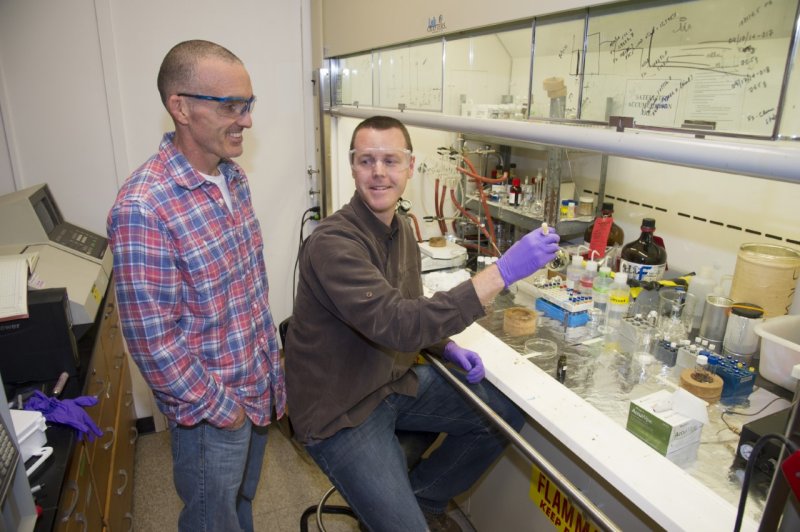WWU, Woods Hole Sign License Agreement for Upwell Cosmetics to Make and Market a Marine Microalga-Derived Wax
This advancement is thanks to a recent license agreement between WWU, the Woods Hole Oceanographic Institution (WHOI) — which jointly own the patents — and Upwell Cosmetics, a start-up materials company founded in Woods Hole, Mass.
This natural wax, a family of widely-studied compounds—known as alkenones—harvested from the microalga Isochrysis, has the potential to replace petroleum ingredients as the waxy base in many cosmetics and personal care products, such as lipstick, sunscreen, and deodorants.
While a cosmetics product might seem unusual for a higher-education institution to be involved with, this license agreement allows practical research to reach the market for broad benefit to society and to the licensing institutions.
Greg O’Neil, a professor of chemistry at Western, has collaborated with Woods Hole’s Chris Reddy to look for other potential practical uses for alkenones for years. After some of those uses — biodiesel and jet fuel in particular — didn’t pan out because they were uneconomical, they focused on some other possible uses and together came up with the idea of cosmetics.
“I viewed this as a great opportunity to continue this alkenone research along a path that could provide an economic benefit, but would also remain an engaging subject for the students in my lab here at Western,” O’Neil said. “And the more we got into it, the more that proved to be true.”
For Chris Reddy, a senior scientist in WHOI’s Marine Chemistry and Geochemistry Department, who has researched these naturally produced compounds for over 20 years, this wax product highlights the vast resources of the ocean which, if managed properly, can benefit humanity. He said the product also shows that basic science also has great value, particularly when paired with the necessary determination to go from the laboratory to the market.
Daniella Zakon, founder and CEO of Upwell Cosmetics, said the product shows “great potential to replace petroleum and animal-based wax in personal care products.” Zakon, an entrepreneur who has degrees in marine biology, environmental science, and business, said she also “is passionate about bridging the gap between science and business” and hopes this license agreement opens up the door for other innovative agreements. Zakon was joined by Alexandra Dowling Lari in 2019 as a co-founder. Dowling Lari’s career spans the luxury beauty sector, with a pivot to sustainability in recent years, including roles at LVMH, Moda Operandi, and most recently Captain Blankenship.
Isochrysis microalgae have been grown for years by companies around the world as a primary component of shellfish feed. While new to cosmetics and personal care products, the alkenones, produced by only a few algae in the ocean, have been studied for decades to decipher historical changes in the ocean temperature.
There is obviously a big push, and big incentives, across many industries to replace petroleum products with alternatives from renewable sources, whether we're talking about fuel or cosmetics.
Greg O'Neil
WWU Professor of Chemistry
In 2005, Reddy and Scott Lindell, a research specialist in WHOI’s Applied Ocean Physics and Engineering Department, began to study alkenones to see if biofuel could be derived from the algae. Because neither O’Neil, Reddy, or Lindell are cosmetic scientists, they approached Gabriella Baki, director of the BSPS Cosmetic Science and Formulation Design Program and associate professor of pharmaceutics at the University of Toledo, Ohio. Baki made some lipsticks and other products, using the alkenone waxes that students in O’Neil’s lab have been involved with extracting, isolating, and characterizing. Baki, Reddy, O’Neil, and others subsequently co-authored a 2019 article in the International Journal of Cosmetic Science that favorably evaluated alkenones as a structuring agent for lipsticks.
After several years of discussion and building a business plan and team, a license agreement was reached. Now, Upwell, which is a materials and ingredients company, is working with manufacturers to make the wax and is contacting cosmetics and personal care companies to convince them to use the wax in their own products.
“I don’t think there’s a single brand we’ve spoken with who has not been interested in the wax,” Dowling Lari said, adding that the first product launch by a company could be as soon as this summer.
The big picture about alkenone research is two-fold, said O’Neil.
“There is obviously a big push, and big incentives, across many industries to replace petroleum products with alternatives from renewable sources, whether we're talking about fuel or cosmetics. There is a mandate at many companies, not just cosmetic companies, to move away from using petroleum products,” he said. He also noted it’s also important not to forget that these alkenones are just one of perhaps a number of products, such as biodiesel, that can be isolated from the algae.
The license agreement is a big deal at WWU, said O’Neil.
“I’m hoping this is a catalyst to start seeing more of this happening, because it’s good for the university’s visibility and for the surrounding community,” he said.
